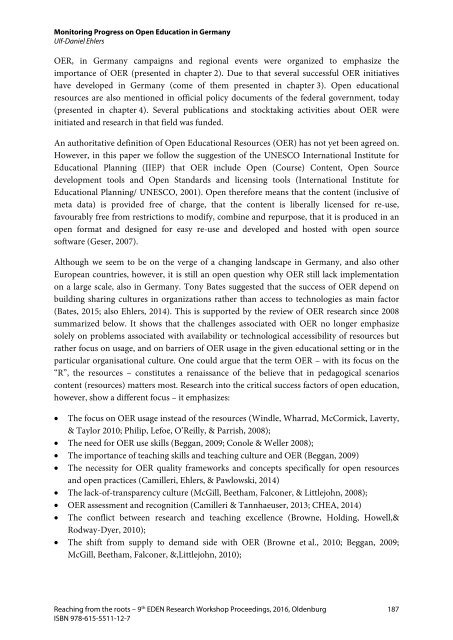Forging new pathways of research and innovation in open and distance learning
RW_2016_Oldenburg_Proceedings
RW_2016_Oldenburg_Proceedings
You also want an ePaper? Increase the reach of your titles
YUMPU automatically turns print PDFs into web optimized ePapers that Google loves.
Monitor<strong>in</strong>g Progress on Open Education <strong>in</strong> Germany<br />
Ulf-Daniel Ehlers<br />
OER, <strong>in</strong> Germany campaigns <strong>and</strong> regional events were organized to emphasize the<br />
importance <strong>of</strong> OER (presented <strong>in</strong> chapter 2). Due to that several successful OER <strong>in</strong>itiatives<br />
have developed <strong>in</strong> Germany (come <strong>of</strong> them presented <strong>in</strong> chapter 3). Open educational<br />
resources are also mentioned <strong>in</strong> <strong>of</strong>ficial policy documents <strong>of</strong> the federal government, today<br />
(presented <strong>in</strong> chapter 4). Several publications <strong>and</strong> stocktak<strong>in</strong>g activities about OER were<br />
<strong>in</strong>itiated <strong>and</strong> <strong>research</strong> <strong>in</strong> that field was funded.<br />
An authoritative def<strong>in</strong>ition <strong>of</strong> Open Educational Resources (OER) has not yet been agreed on.<br />
However, <strong>in</strong> this paper we follow the suggestion <strong>of</strong> the UNESCO International Institute for<br />
Educational Plann<strong>in</strong>g (IIEP) that OER <strong>in</strong>clude Open (Course) Content, Open Source<br />
development tools <strong>and</strong> Open St<strong>and</strong>ards <strong>and</strong> licens<strong>in</strong>g tools (International Institute for<br />
Educational Plann<strong>in</strong>g/ UNESCO, 2001). Open therefore means that the content (<strong>in</strong>clusive <strong>of</strong><br />
meta data) is provided free <strong>of</strong> charge, that the content is liberally licensed for re-use,<br />
favourably free from restrictions to modify, comb<strong>in</strong>e <strong>and</strong> repurpose, that it is produced <strong>in</strong> an<br />
<strong>open</strong> format <strong>and</strong> designed for easy re-use <strong>and</strong> developed <strong>and</strong> hosted with <strong>open</strong> source<br />
s<strong>of</strong>tware (Geser, 2007).<br />
Although we seem to be on the verge <strong>of</strong> a chang<strong>in</strong>g l<strong>and</strong>scape <strong>in</strong> Germany, <strong>and</strong> also other<br />
European countries, however, it is still an <strong>open</strong> question why OER still lack implementation<br />
on a large scale, also <strong>in</strong> Germany. Tony Bates suggested that the success <strong>of</strong> OER depend on<br />
build<strong>in</strong>g shar<strong>in</strong>g cultures <strong>in</strong> organizations rather than access to technologies as ma<strong>in</strong> factor<br />
(Bates, 2015; also Ehlers, 2014). This is supported by the review <strong>of</strong> OER <strong>research</strong> s<strong>in</strong>ce 2008<br />
summarized below. It shows that the challenges associated with OER no longer emphasize<br />
solely on problems associated with availability or technological accessibility <strong>of</strong> resources but<br />
rather focus on usage, <strong>and</strong> on barriers <strong>of</strong> OER usage <strong>in</strong> the given educational sett<strong>in</strong>g or <strong>in</strong> the<br />
particular organisational culture. One could argue that the term OER – with its focus on the<br />
“R”, the resources – constitutes a renaissance <strong>of</strong> the believe that <strong>in</strong> pedagogical scenarios<br />
content (resources) matters most. Research <strong>in</strong>to the critical success factors <strong>of</strong> <strong>open</strong> education,<br />
however, show a different focus – it emphasizes:<br />
• The focus on OER usage <strong>in</strong>stead <strong>of</strong> the resources (W<strong>in</strong>dle, Wharrad, McCormick, Laverty,<br />
& Taylor 2010; Philip, Lefoe, O’Reilly, & Parrish, 2008);<br />
• The need for OER use skills (Beggan, 2009; Conole & Weller 2008);<br />
• The importance <strong>of</strong> teach<strong>in</strong>g skills <strong>and</strong> teach<strong>in</strong>g culture <strong>and</strong> OER (Beggan, 2009)<br />
• The necessity for OER quality frameworks <strong>and</strong> concepts specifically for <strong>open</strong> resources<br />
<strong>and</strong> <strong>open</strong> practices (Camilleri, Ehlers, & Pawlowski, 2014)<br />
• The lack-<strong>of</strong>-transparency culture (McGill, Beetham, Falconer, & Littlejohn, 2008);<br />
• OER assessment <strong>and</strong> recognition (Camilleri & Tannhaeuser, 2013; CHEA, 2014)<br />
• The conflict between <strong>research</strong> <strong>and</strong> teach<strong>in</strong>g excellence (Browne, Hold<strong>in</strong>g, Howell,&<br />
Rodway-Dyer, 2010);<br />
• The shift from supply to dem<strong>and</strong> side with OER (Browne et al., 2010; Beggan, 2009;<br />
McGill, Beetham, Falconer, &,Littlejohn, 2010);<br />
Reach<strong>in</strong>g from the roots – 9 th EDEN Research Workshop Proceed<strong>in</strong>gs, 2016, Oldenburg 187<br />
ISBN 978-615-5511-12-7


